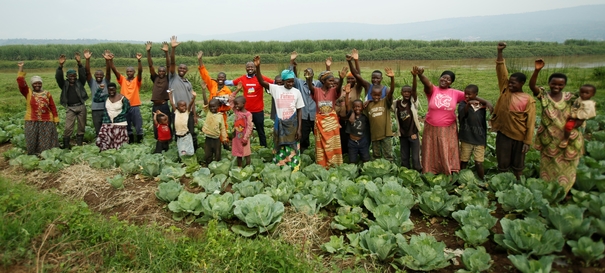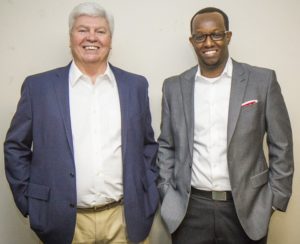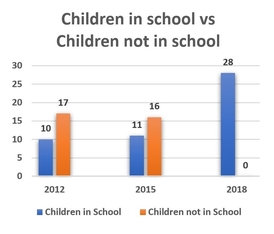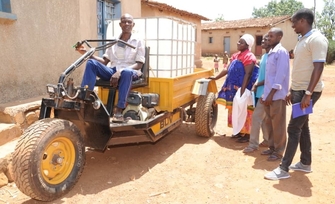
Twisungane Farming Group, Eastern Rwanda
There’s a lot to be excited about within Tools for Hope Rwanda since we first talked with its founders nearly two years ago. Living and working in Knoxville, TN, Joram Kimenyi and Richard Trevillian met at Apostles Anglican several years ago, and since starting Tools for Hope in 2015 have been seeing great strides in the physical, financial, and educational health of its growing group of Rwandan farmers.

Richard Trevillian (L) and Joram Kimenyi, Founders, Tools for Hope Rwanda
“We feel that the farmers have made tremendous progress in the past 18 months,” says Trevillian, citing their especial progress in establishing banking relations. All families in the farming group now have bank accounts, and three families have applied for loans on their own for goat and pig farming without the need for backing from Tools for Hope.
“We are particularly proud of them in this respect,” says Trevillian. “As important as the economic progress they have made is, equally important is the great progress they have made in the areas of health care and schooling for their children.”
Back in 2012, a group of seven men and their families in the Bugesera district of eastern Rwanda joined together to share farming activities and named themselves the Twisungane – meaning “hard workers.” At the time, many of its members had no shelter and were dependent on vending local beer to earn a living. When they started farming, children missed school to carry water from the river during the many dry months.

Statistics on primary school education in the Twisungane farming group, provided by Tools for Hope
In 2015, Tools for Hope started working with the Twisungane group to train them in agricultural practices, provide microloans for irrigation equipment, and provide a local Rwandan agricultural expert to continually train and answer questions. Now the Twisungane group has grown to 20 families, and 100% of their school-age children are in school and can afford school materials.
Additionally, all families can now pay for health insurance, where only four families could previously afford it. And the land that once produced only 220 pounds of food is now yielding two tons of produce.
“For us it means that the group is very nearly self-sustaining,” says Trevillian. “They would be able to carry on and continue to improve even without our support.”
In fact, the Twisungane group has become so successful that it’s drawing much interest from other farming groups and encouragement from local leadership. Kimenyi and Trevillian are in discussions with their on-site Rwandan employee Frank Mutesa on how best to start mentoring new groups, with the current group passing along the knowledge and skills they’ve gained from Tools for Hope.
The last couple of years have not been without challenge, however: the main difficulty being suitable farming equipment for the group. After months of Tools for Hope working with the Rwandan government to bring in a Basic Utility Vehicle (or, BUV) and Mutesa training the farmers on the vehicle, it has turned out to be unsuitable for the mountainous terrain the farmers cultivate. Trevillian, though, is encouraged at the farmers’ decision to reject the current BUV, and says it speaks to optimism in their community.

Basic Utility Vehicle funded by Tools for Hope
“It demonstrates that… the training we gave the farmers was successful, because they were able to do a simple cost-benefit analysis and decide that, in their case, the BUV would have more potential downside than upside,” he says. “It says to us that they looked at the BUV and decided that they have other opportunities in their future that will be much better than what the BUV is currently offering.”
Tools for Hope is now exploring different BUVs used in similar mountainous farming communities, and is still teaming with the Mechanical Engineering Department of Baylor University to develop a viable BUV for the Rwandan farmers’ work environment.
Another new consideration is how the growth of the Twisungane group has led to new business opportunities and ideas for microloans. Projects like goat herding, raising poultry and swine, offering computer and internet services, and sewing clothing have low start-up costs while promising sustainable returns for group members. High on the list is funding one or more motorbikes to use for farming purposes, but also so group members could be hired for transportation services. Tools for Hope is working with the farmers to prioritize their proposed projects.
“We want to help them manage issues such as sharing in profits as well as losses in projects, past, present, and future,” says Trevillian. “Newer members may have a different perspective on those issues than the original members.”
As the farming group grows, so is Tools for Hope. Current financial needs include additional funding for Frank Mutesa to support his heavier workload in mentoring new farming groups, and funding for travel and salaries in 2019. The organization is currently looking for one more corporate officer, as well as people willing to join their problem-solving team.
“We think that a larger group of interested people with diverse life, work, and educational experiences would work best for helping us not just administer the corporation, but help solve problems ranging from fund-raising to long-term social and economic development for the subsistence farmers in East Central Africa,” says Trevillian. “We have many more potential projects and needs than we will be able to fund. We need help in evaluating and funding the best projects.”
For those wishing to learn more about the needs and challenges in Rwanda, The Anglican Relief and Development Fund is offering a vision trip there July 28-August 10, an opportunity welcomed by Trevillian.
“We believe that Anglican outreach programs aimed at understanding the need to address the problems caused by poverty in Rwanda are important,” he says.
Tools for Hope highly values dignity and local ownership of solutions that bring an end to poverty — visit their website to learn more and to consider how you can contribute to their current funding or personnel needs, read our previous article for more insight about Tools for Hope, or consider the 2019 Rwanda vision trip with ARDF.
“Tools for Hope continues to have close to zero overhead, so that almost all donated support goes to assisting the farmers. The local leaders support our work based on the outcomes for the Twisungane group over the past few years,” says Trevillian. “The Twisungane group has grown and prospered.”

by Rachel Moorman
Communications Associate
news@adots.org
